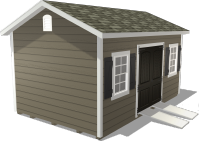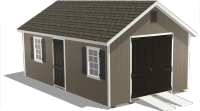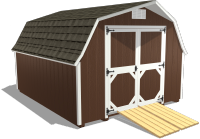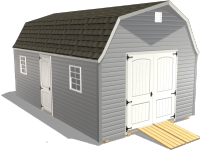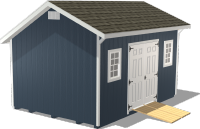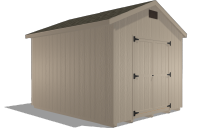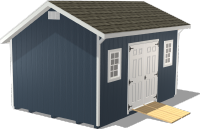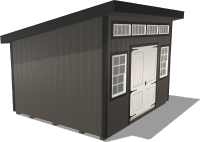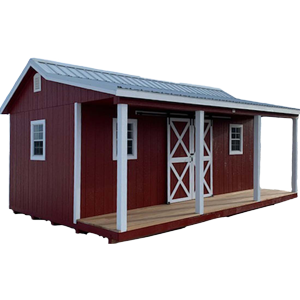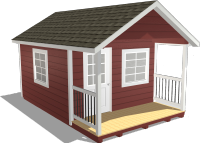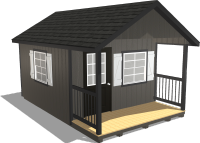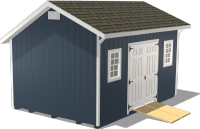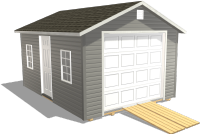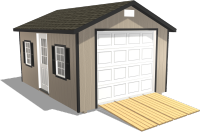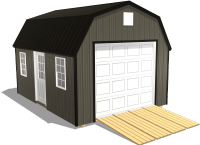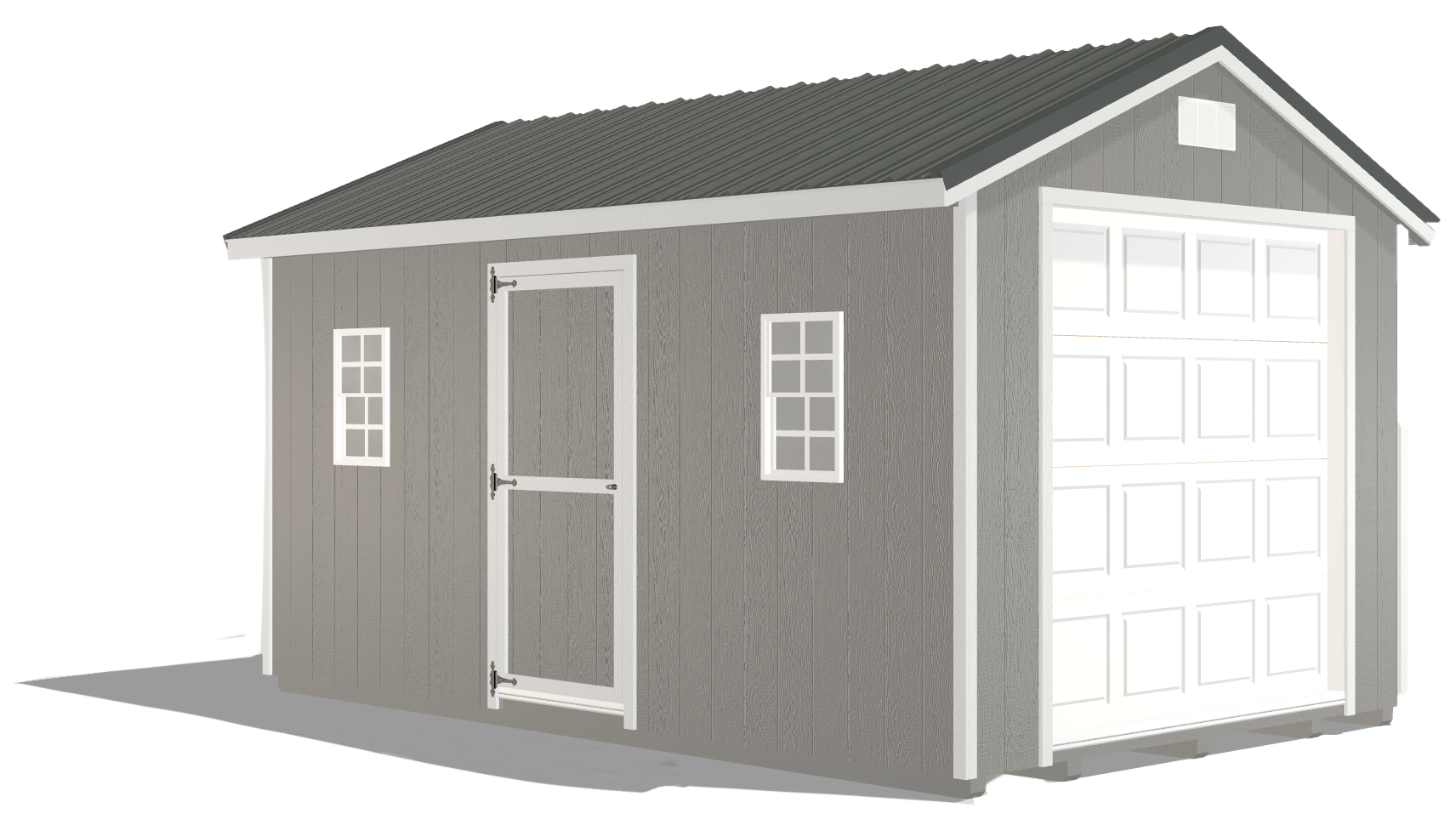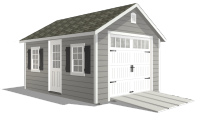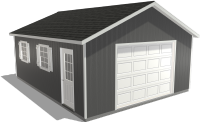Comparing Attached vs. Detached Garages: Which is Right for You?
by Dakota Storage Buildings, on November 13, 2024

When adding a garage to your home or property, one of the first decisions you will need to make is whether to opt for an attached or detached structure. This choice impacts several factors, including cost, convenience, space, and even long-term property value. Deciding which garage style is best for you depends on your unique needs, property layout, and budget. Let’s compare attached vs. detached garages to help you make an informed decision.
What Sets Attached and Detached Garages Apart?
Before diving into the pros and cons of each option, it is important to define what we mean by "attached" and "detached" garages.
Attached Garage: As the name suggests, an attached garage is connected directly to your house. This type of garage shares at least one wall with the main structure of the home, making it part of the house itself.
Detached Garage: A detached garage is a stand-alone structure, completely separate from the main house. It can be placed anywhere on your property, offering more design and location flexibility.
Each type of garage is commonly found in different settings. Attached garages are often seen in suburban homes where space is more limited, while detached garages are frequently found on larger properties or older homes where the architectural style benefits from having the garage as a separate structure.
The Pros and Cons of Attached Garages
When deciding whether to opt for an attached garage, it is important to weigh the pros and cons carefully. While an attached garage offers convenience and security, it may also come with limitations in design flexibility and potential noise or odors. Understanding these factors will help you determine if an attached garage is the right fit for your home and lifestyle.

Pros:
Convenience: One of the biggest benefits of an attached garage is easy access to the home. In bad weather, you can move between your car and house without having to go outside. This convenience is particularly beneficial for families with children or those who frequently carry groceries, equipment, or other items to and from the car. It also makes unloading and loading the car easier and more efficient, saving you time and hassle on busy days.
Increased Security: Attached garages often have a direct entry into the home, making it easier to lock up and secure both your car and your living space. For homeowners concerned about security, this seamless connection can be a reassuring feature. Having the garage attached to the house provides extra protection for your car or valuables from vandalism or theft.
Cons:
Limited Design Flexibility: Since the garage is part of the home, there may be restrictions on where it can be placed and how large it can be. The garage will likely need to follow the existing design of the house, which can limit customization options. This lack of flexibility may also impact future expansion plans for your garage and home since reconfiguring the existing layout could become costly and a headache. Since altering the layout can be complicated, it is essential to consider your long-term goals before making a decision.
Potential for Noise and Odors: Because the garage is connected to your home, any noise from vehicles or equipment can easily travel indoors. Odors from gasoline, paint, or other chemicals stored in the garage may seep into the house. Over time, this can affect indoor air quality and create unpleasant smells in living spaces, especially if proper ventilation is not in place.
The Benefits and Drawbacks of Detached Garages
Detached garages offer greater design flexibility, versatile usage options, and the chance to enhance your property’s aesthetics. However, they also come with a slight challenge. Weighing these factors will help you determine if a detached garage suits your needs and lifestyle.

Pros:
Design Flexibility: Detached garages offer much more freedom when it comes to garage size, shape, and placement. You can position the garage anywhere on your property, which lets you better utilize the outdoor space and provides more opportunities for customization. This flexibility also enables you to design the garage independently from the house, whether you want it to serve as a separate architectural feature or to meet specific functional needs.
Versatile Usage: A detached garage can serve multiple purposes. Many homeowners use detached garages as workshops, guest houses, or extra storage spaces. With a detached garage, you have the flexibility to design the interior for specific needs without worrying about the limitations that an attached structure might present. This versatility allows you to convert the space into a home office, a gym, or even a hobby room, adapting to your evolving needs over time.
Enhanced Aesthetics: A detached garage can complement the overall look and feel of your property. Whether you want the garage to blend seamlessly into the landscape or stand out as a unique structure, the detached design offers more options to enhance your home’s aesthetic appeal. You can also match the garage’s exterior with your home or choose a contrasting design to create visual interest and increase curb appeal.
Cons:
Different Access Experience: Unlike an attached garage, accessing a detached garage requires going outside. This can be inconvenient, especially during bad weather when walking between the garage and the house can become a hassle. Carrying heavy items from the car to the house may require more effort with a detached garage. Over time, the distance between the house and garage can make daily tasks slightly less efficient, particularly during winter or rainy months.
5 Key Factors to Consider Before Selecting a Garage
Comparing attached vs. detached garages and choosing between the two ultimately comes down to personal preferences and practical needs. Here are a few key factors to consider before making your decision.
![]()
1. Property Size
If your property has ample space, a detached garage offers more design flexibility and opportunities for expansion. You can position the garage wherever it makes the most sense for your needs, whether that is closer to a workshop area or in a more secluded part of your property. On smaller properties, an attached garage may be the better option due to space constraints, as it can maximize available space without sacrificing yard or garden areas. It is essential to assess how much room you need for parking and additional storage while balancing the aesthetic and functional layout of your outdoor space.
![]()
2. Budget
Generally, attached garages tend to be more cost-effective since they share walls and systems (such as electricity, plumbing, or HVAC) with the house. This shared infrastructure reduces overall building costs and simplifies installation. Detached garages offer more flexibility in design and placement, and can even be a budget-friendly option for many homeowners. However, the farther a detached garage is from the house, the higher the cost of running electrical or plumbing lines, so it is important to factor these potential expenses into your decision.
![]()
3. Intended Usage
Think about how you plan to use the garage, as this will heavily influence whether an attached or detached option is best for you. If you need a space for hobbies, a workshop, or extra storage, a detached garage might offer more freedom for customization without disturbing the main living area. Detached garages are ideal for creating a dedicated workspace or additional storage without impacting the flow of your home. If you are primarily looking for a place to park your car with easy access to your home, an attached garage could be the best fit, offering a convenient transition between your vehicle and living spaces, especially during harsh weather.
![]()
4. Future Plans
Consider how the garage fits into your long-term plans for your property. If you plan to expand your home or sell it, the type of garage you choose can affect both the resale value and the potential for future renovations. An attached garage may appeal more to future buyers looking for convenience, while a detached garage could provide opportunities to expand it into a guest house, office, or even a rental unit down the line. Additionally, think about your evolving needs — if your family grows or your storage needs increase, a detached garage may offer more flexibility for future modifications.
![]()
5. Weather and Climate
If you live in an area with extreme weather conditions, an attached garage offers better protection from the elements, allowing you to move between your car and home without exposure to cold, heat, or rain. This is especially beneficial in regions with harsh winters, as it helps keep your vehicle and belongings sheltered from snow and freezing temperatures. However, with proper insulation and heating options, a detached garage can still be a great option even in colder climates, offering more flexibility in usage and placement without sacrificing comfort. In warmer climates, a detached garage may even help reduce heat buildup in the home by keeping vehicle emissions and outdoor heat at a distance.
Choosing the Best Garage for Your Property

When deciding between an attached vs. detached garage, it is important to weigh the pros and cons based on your specific needs, property layout, and budget. Attached garages offer convenience and security but detached garages provide greater design flexibility and versatile usage. Both options have their unique benefits, and the best choice depends on how you plan to use the space and what works best for your home.
If you are ready to explore garage options that fit your property and lifestyle, we offer a variety of high-quality, pre-built garage designs to suit your needs. Browse our stock garages today and take the first step toward finding the perfect solution for your home.



